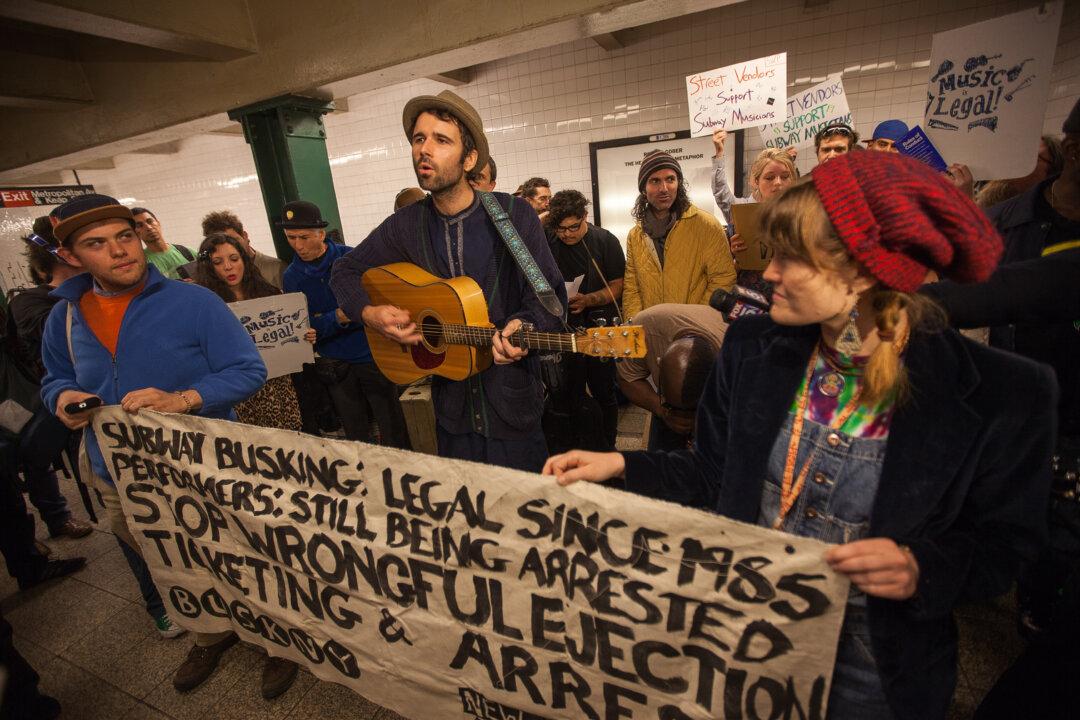NEW YORK—Andrew Kalleen sat in the police booth of the Metropolitan Avenue subway station—quiet and collected. He was looking back at his Friday experience. It wasn’t his first encounter with the police, but it was the first time he stood up for what he believed was his right—to play his music on a subway platform.
He got arrested, spent over five hours in detention, and then got a ticket.
On Tuesday afternoon he returned to the mezzanine of the stop where he was arrested in Williamsburg, Brooklyn, to file a complaint. And he didn’t come alone.
Two council members, two non-profits, one union, and a host of fellow performers came along to rally against the way the police treat subway performers.
“Harassing performers doesn’t make the community safer,” said Councilmember Robert Cornegy.
The speakers blamed “broken windows policing,” a tactic propagated by NYPD Commissioner Bill Bratton, emphasizing punishment of small offenses to create an atmosphere of no tolerance for crime.
Yet finding ways to purge the subway performers may have encroached on a tradition dear to many New Yorkers.
“That is New York culture,” said Councilmember Steve Levin.
“Nothing was broken down there,” said Kalleen. “The peace was disturbed when the officer came.”
It’s a common misconception that musicians need a permit to play in subway stations. The Metropolitan Transportation Authority does not have such a rule, but the officer arresting Kalleen thought otherwise.
Advocates for performers brought up concerns about New York Police Department training because arrests like Kalleen’s happen so frequently.
The Civilian Complaint Review Board (CCRB), which logs police complaints, does not categorize subway arrest complaints and it is not clear how many performing artists are annually ejected, arrested, or file a complaint.
An NYPD spokesperson said Tuesday the department is investigating the matter.
A video of the arrest was put on YouTube and has over 520,000 views.
Matthew Shapiro, an attorney at the Urban Justice Center, works for a non-profit defending street vendors from harassment. The situation with performers is similar, he said, because they are both easy targets for police harassment.
“Performing music in a public space, along with having a hot dog in a public space, are iconic aspects of New York City and they’re here to stay,” said Shapiro.
Trouble With Complaints
Complaints to the CCRB for wrongful arrests seldom bear any results. The board only handles cases where the arresting officer is accused of misconduct.
If the arrest was conducted properly, but for the wrong reason, the board will submit the case to NYPD’s Office of the Chief of Department to handle the case internally.
Matthew Christian from arts advocacy group BuskNY has been arrested himself for performing on a subway.
He was charged with loitering, but the charge was dropped before he made it to court.
He tried to complain to the CCRB before, but the case was sent to NYPD and he never heard about it again.
Instead he sued the arresting officer and earned a financial settlement from the city.
Kalleen is ready to follow suit. “I plan to sue whoever’s responsible,” he said.
“We have to work to be the land of the free,” Kalleen said.
Epoch Times Staff members Amelia Pang and Catherine Yang, and The Associated Press contributed to this report.






